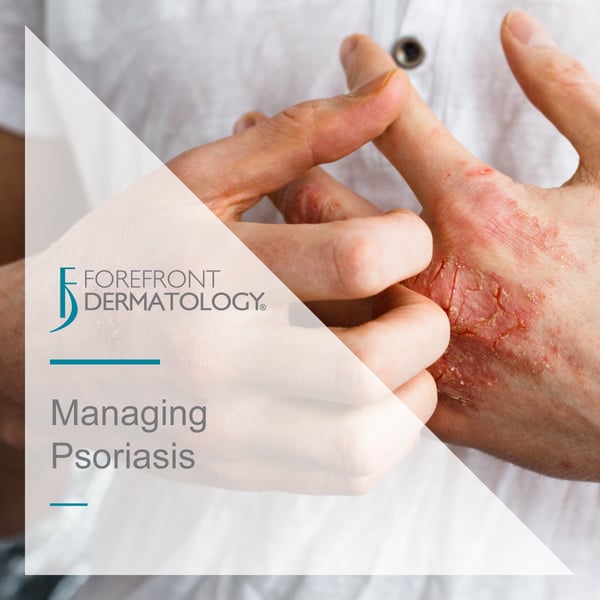
August is national psoriasis awareness month. If you or someone you know was recently diagnosed with psoriasis it’s important to learn more about the condition and how you can manage it.
What is psoriasis?
Psoriasis is a skin disease associated with the immune system which causes your skin cells to reproduce too quickly. According to Dr. Shilpa Sawardekar, board-certified dermatologist with Forefront Dermatology, “a normal skin cell matures and falls off the body’s surface in 28 to 30 days. However, skin affected by psoriasis takes only three to four days to mature and move to the surface. Instead of the cells falling off, they pile up and form scaly lesions.”
What triggers psoriasis?
People with psoriasis have flare ups that are caused by “triggers.” Triggers are not universal – what may cause one person’s psoriasis to become active may not affect another’s. There are four main factors that are recognized as triggers that may induce flare ups:
• Stress – it is common for 30 to 50 percent of patients to report a flare up following stress, usually within 30 days of the stress event. It is important for psoriasis sufferers to effectively cope with stress.
• Skin Injury – studies have shown that up to 90 percent of patients have a flare up that will develop in the injured site as it heals.
• Infection – a study of 245 children revealed that 25 percent had an onset of psoriasis following an infection such as upper respiratory infections. Infections are a common trigger to the guttate subtype of psoriasis.
• Alcohol – researchers believe that heavy alcohol consumption affects psoriasis by slowing down or stopping the effects of the medications, lowering your immune function, increasing inflammation and causing dehydration. All of these effects of alcohol consumption tie heavily into the healthiness of your skin.
Managing Psoriasis
While there is no cure for psoriasis, there are treatment options available to help prevent flare ups and alleviate the symptoms. “Treatment depends on how serious the disease, the size of the psoriasis patches and the type of psoriasis,” noted Dr. Sawardekar. “Treatments work differently for each sufferer. Your dermatologist may switch treatments if one doesn’t work, if there is a bad reaction or if your current treatment stops working. Common treatment options include topical treatments, light therapy, prescription medication or combination therapy.”
Skin Struggles?
At Forefront Dermatology, we know that life is all about the moments when you don’t need us. That’s why we’re here for all the moments when you do. We offer comprehensive and compassionate care for all skin conditions and create customized treatment plans for all stages and ages – even the tiniest of patients! Find a dermatologist near me.





